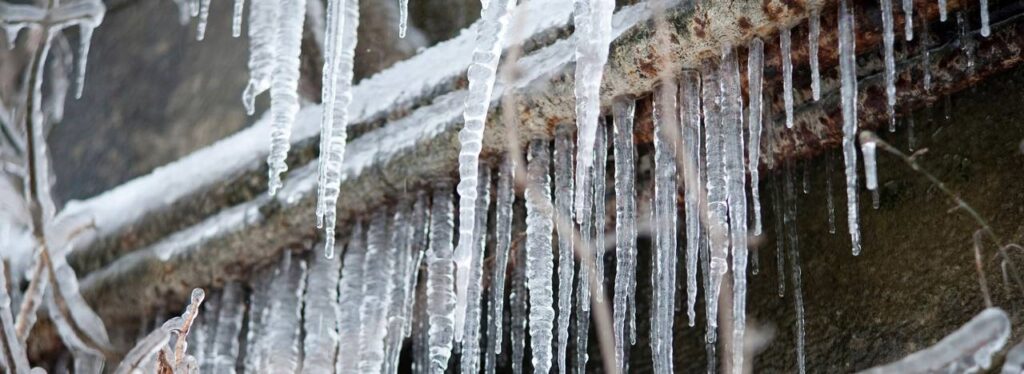How do you feel on the subject of Helpful Tips to Prevent Frozen Pipes this Winter?

Cold weather can wreak havoc on your plumbing, specifically by freezing pipes. Right here's just how to prevent it from taking place and what to do if it does.
Intro
As temperature levels decline, the risk of frozen pipelines rises, possibly leading to expensive fixings and water damages. Understanding exactly how to prevent frozen pipelines is essential for house owners in chilly climates.
Avoidance Tips
Protecting at risk pipes
Wrap pipes in insulation sleeves or use heat tape to safeguard them from freezing temperatures. Focus on pipelines in unheated or external areas of the home.
Heating methods
Maintain interior spaces properly heated up, especially areas with pipes. Open cupboard doors to permit warm air to flow around pipelines under sinks.
Just how to recognize frozen pipelines
Look for reduced water flow from faucets, uncommon smells or noises from pipes, and noticeable frost on exposed pipes.
Long-Term Solutions
Structural modifications
Think about rerouting pipes far from outside wall surfaces or unheated areas. Add additional insulation to attics, cellars, and crawl spaces.
Updating insulation
Buy top quality insulation for pipes, attic rooms, and walls. Appropriate insulation assists maintain consistent temperature levels and reduces the danger of frozen pipelines.
Securing Outside Plumbing
Yard hose pipes and outside faucets
Disconnect and drain pipes yard hoses before winter months. Install frost-proof faucets or cover outside faucets with protected caps.
Understanding Frozen Pipelines
What triggers pipes to freeze?
Pipes freeze when subjected to temperatures below 32 ° F (0 ° C) for expanded durations. As water inside the pipelines freezes, it increases, putting pressure on the pipe wall surfaces and potentially triggering them to break.
Threats and damages
Icy pipelines can result in supply of water disruptions, residential or commercial property damages, and costly repairs. Burst pipes can flood homes and create comprehensive structural damages.
Signs of Frozen Water Lines
Recognizing icy pipes early can prevent them from breaking.
What to Do If Your Pipes Freeze
Immediate actions to take
If you think frozen pipes, maintain taps open up to relieve stress as the ice thaws. Utilize a hairdryer or towels soaked in hot water to thaw pipelines gradually.
Verdict
Protecting against icy pipes requires proactive measures and fast responses. By recognizing the reasons, signs, and preventive measures, homeowners can safeguard their plumbing during winter.
Helpful Tips to Prevent Frozen Pipes this Winter
UNDERSTANDING THE BASICS: WHY PIPES FREEZE AND WHY IT’S A PROBLEM
Water freezing inside pipes is common during the winter months, but understanding why pipes freeze, and the potential problems it can cause is crucial in preventing such incidents. This section will delve into the basics of why pipes freeze and the associated problems that may arise.
THE SCIENCE BEHIND FROZEN PIPES
When water reaches freezing temperatures, it undergoes a physical transformation and solidifies into ice. This expansion of water as it freezes is the primary reason pipes can burst. As the water inside the pipe freezes, it expands, creating immense pressure on the walls. If the pressure becomes too great, the pipe can crack or rupture, leading to leaks and water damage.
FACTORS THAT CONTRIBUTE TO PIPE FREEZING
Low Temperatures: Extremely cold weather, especially below freezing, increases the risk of pipes freezing. Uninsulated or Poorly Insulated Pipes: Pipes located in unheated areas, such as basements, crawl spaces, or attics, are more prone to freezing. Insufficient insulation or lack of insulation altogether exacerbates the problem. Exterior Wall Exposure: Pipes running along exterior walls are susceptible to freezing as they encounter colder temperatures outside. Lack of Heating or Temperature Regulation: Inadequate heating or inconsistent temperature control in your home can contribute to frozen pipes. PROBLEMS CAUSED BY FROZEN PIPES
- Pipe Bursting: As mentioned earlier, the expansion of water as it freezes can cause pipes to burst, resulting in significant water damage.
- Water Damage: When pipes burst, it can lead to flooding and water damage to your property, including walls, ceilings, flooring, and personal belongings.
- Structural Damage: Prolonged exposure to water from burst pipes can compromise the structural integrity of your home, leading to costly repairs.
- Mold and Mildew Growth: Excess moisture from water damage can create a favorable environment for mold and mildew growth, posing health risks to occupants.
- Disrupted Water Supply: Frozen pipes can also result in a complete or partial loss of water supply until the issue is resolved.
WHY CERTAIN PIPES ARE MORE PRONE TO FREEZING
- Location: Pipes located in unheated or poorly insulated areas, such as basements, crawl spaces, attics, or exterior walls, are at higher risk of freezing.
- Exterior Pipes: Outdoor pipes, such as those used for irrigation or exposed plumbing, are particularly vulnerable to freezing as they are directly exposed to the elements.
- Supply Lines: Pipes that carry water from the main water supply into your home, including the main water line, are critical to protect as freezing in these lines can affect your entire plumbing system.
- Underground Pipes: Pipes buried underground, such as those connected to sprinkler systems or outdoor faucets, can be susceptible to freezing if not properly insulated.
https://busybusy.com/blog/helpful-tips-to-prevent-frozen-pipes-this-winter/

I recently found that content about Helpful Tips to Prevent Frozen Pipes this Winter when scouting around the web. Be sure to take the opportunity to share this blog post if you enjoyed reading it. Thanks so much for your time invested reading it.
This Page